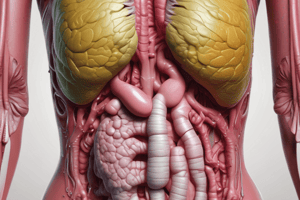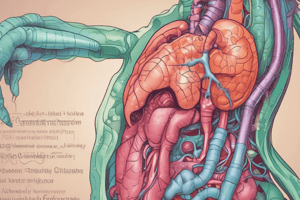Podcast
Questions and Answers
What indicates anorexia in an individual?
What indicates anorexia in an individual?
- Desire to eat despite physiological hunger
- Eating in response to emotional stress
- A lack of desire to eat despite physiological stimuli (correct)
- Increased appetite in response to hunger cues
Which symptom is commonly associated with vomiting?
Which symptom is commonly associated with vomiting?
- Tachycardia (correct)
- Dehydration
- Constipation
- Anorexia
What is projectile vomiting typically caused by?
What is projectile vomiting typically caused by?
- Emotional stress
- Dietary choices
- Neurological lesions in the brain stem (correct)
- Stomach flu
Which of the following describes retching?
Which of the following describes retching?
What characterizes constipation as a primary condition?
What characterizes constipation as a primary condition?
Which symptom might indicate the presence of constipation?
Which symptom might indicate the presence of constipation?
Which factor is NOT typically a cause of secondary constipation?
Which factor is NOT typically a cause of secondary constipation?
What is a common consequence of vomiting in an individual?
What is a common consequence of vomiting in an individual?
What type of diarrhea is characterized by excessive amounts of water or secretions in the intestines?
What type of diarrhea is characterized by excessive amounts of water or secretions in the intestines?
Which of the following is NOT a mechanism of diarrhea?
Which of the following is NOT a mechanism of diarrhea?
What conservative treatment is typically employed for a hiatal hernia?
What conservative treatment is typically employed for a hiatal hernia?
Which symptom is commonly associated with dysphagia?
Which symptom is commonly associated with dysphagia?
What serious complication can result from severe diarrhea?
What serious complication can result from severe diarrhea?
Which condition is indicated by the reflux of acid and pepsin from the stomach into the esophagus?
Which condition is indicated by the reflux of acid and pepsin from the stomach into the esophagus?
What is a common symptom of gastroesophageal reflux disease (GERD)?
What is a common symptom of gastroesophageal reflux disease (GERD)?
What is a potential systemic effect of diarrhea?
What is a potential systemic effect of diarrhea?
Which type of gastrointestinal bleeding involves the jejunum, ileum, colon, or rectum?
Which type of gastrointestinal bleeding involves the jejunum, ileum, colon, or rectum?
What type of abdominal pain is typically associated with tissue injury and inflammation?
What type of abdominal pain is typically associated with tissue injury and inflammation?
What is the most common cause of ascites?
What is the most common cause of ascites?
Which symptom is associated with the early stages of hepatic encephalopathy?
Which symptom is associated with the early stages of hepatic encephalopathy?
Which of the following best describes jaundice?
Which of the following best describes jaundice?
What is a common risk factor for cholelithiasis?
What is a common risk factor for cholelithiasis?
What characterizes the progression of cirrhosis?
What characterizes the progression of cirrhosis?
Which type of jaundice is caused by excessive hemolysis of red blood cells?
Which type of jaundice is caused by excessive hemolysis of red blood cells?
What type of gallstone is formed from bile that is supersaturated with cholesterol?
What type of gallstone is formed from bile that is supersaturated with cholesterol?
Which symptom is NOT typical of late-stage hepatic encephalopathy?
Which symptom is NOT typical of late-stage hepatic encephalopathy?
What is a common consequence of portal hypertension?
What is a common consequence of portal hypertension?
What is the primary neurological issue in hepatic encephalopathy?
What is the primary neurological issue in hepatic encephalopathy?
Where do gastric ulcers primarily develop in the stomach?
Where do gastric ulcers primarily develop in the stomach?
What is a primary defect in the pathophysiology of gastric ulcers?
What is a primary defect in the pathophysiology of gastric ulcers?
Which vitamin deficiency is associated with night blindness?
Which vitamin deficiency is associated with night blindness?
What characterizes ulcerative colitis?
What characterizes ulcerative colitis?
In Crohn disease, which of the following is a common symptom?
In Crohn disease, which of the following is a common symptom?
What is a notable symptom of irritable bowel syndrome?
What is a notable symptom of irritable bowel syndrome?
Which of the following is NOT a complication of appendicitis?
Which of the following is NOT a complication of appendicitis?
What body mass index (BMI) indicates obesity?
What body mass index (BMI) indicates obesity?
What is a common clinical manifestation of portal hypertension?
What is a common clinical manifestation of portal hypertension?
What is the main reason for the development of obesity?
What is the main reason for the development of obesity?
Which of the following is TRUE regarding malabsorption syndromes?
Which of the following is TRUE regarding malabsorption syndromes?
Which treatment is often used for moderate ulcerative colitis?
Which treatment is often used for moderate ulcerative colitis?
What is a symptom that typically does NOT occur with irritable bowel syndrome?
What is a symptom that typically does NOT occur with irritable bowel syndrome?
What nutritional deficiency can result from Crohn disease?
What nutritional deficiency can result from Crohn disease?
What is the most common cause of cholecystitis?
What is the most common cause of cholecystitis?
Which of the following symptoms is frequently associated with esophageal cancer?
Which of the following symptoms is frequently associated with esophageal cancer?
What triggers pancreatitis?
What triggers pancreatitis?
What is a common risk factor for stomach cancer?
What is a common risk factor for stomach cancer?
What characterizes liver cancer in most cases?
What characterizes liver cancer in most cases?
Which type of cancer is primarily associated with metaplastic exocrine cells in the ducts?
Which type of cancer is primarily associated with metaplastic exocrine cells in the ducts?
What are the early symptoms of gallbladder cancer typically like?
What are the early symptoms of gallbladder cancer typically like?
What is a common symptom of colon cancer in its early stages?
What is a common symptom of colon cancer in its early stages?
Which condition is most likely linked with chronic pancreatitis?
Which condition is most likely linked with chronic pancreatitis?
What are common findings of cholecystitis?
What are common findings of cholecystitis?
Flashcards are hidden until you start studying
Study Notes
Clinical Manifestations of Gastrointestinal Dysfunction
- Anorexia: Lack of appetite despite physiological hunger signals.
- Vomiting: Forceful expulsion of stomach and intestinal contents, often preceded by nausea. Symptoms include hypersalivation and tachycardia.
- Stimuli for Vomiting: Can be triggered by medications, pain, GI irritation, or increased intracranial pressure.
- Projectile Vomiting: Occurs without prior nausea or retching, linked to neurological lesions in the brain stem.
- Nausea: Subjective sensation often related to various conditions.
- Constipation: Marked by infrequent or difficult bowel movements; can be primary (functional, slow transit) or secondary (dietary, medical factors).
- Diarrhea: Characterized by loose, watery stools. Can be acute or persistent with mechanisms involving osmotic, secretory, or motility factors. Associated risks include dehydration and electrolyte imbalance.
- Abdominal Pain: Can be mechanical, inflammatory, or ischemic, frequently indicating tissue injury.
- Gastrointestinal Bleeding: Can occur in upper (esophagus, stomach, duodenum) or lower (jejunum, ileum, colon, rectum) GI tract; severity depends on blood loss rate and amount.
Disorders of Motility
- Dysphagia: Difficulty swallowing due to mechanical obstructions or functional disorders. Symptoms include stabbing pain and regurgitation.
- Gastroesophageal Reflux Disease (GERD): Caused by acid reflux leading to esophagitis; symptoms include heartburn, dysphagia, and chronic cough.
- Hiatal Hernia: Protrusion of stomach through diaphragm; types include sliding, paraesophageal, and mixed; treatment is usually conservative.
Ulcers and Malabsorption
- Gastric Ulcers: Commonly found in the antral region of the stomach; associated with increased mucosal permeability to hydrogen ions.
- Malabsorption Syndromes: Includes maldigestion (chemical digestion failure) and malabsorption (nutrient absorption failure). Vitamin deficiencies may arise from these conditions.
Inflammatory Bowel Disease
- Ulcerative Colitis: Characterized by ulceration of the colonic mucosa, primarily affecting the sigmoid colon and rectum with symptoms of severe diarrhea and cramping. Treatment involves 5-aminosalicylic acid, steroids, or surgery.
- Crohn Disease: Can affect any part of the GI tract presenting with skip lesions and similar symptoms to ulcerative colitis; may cause vitamin B12 deficiency.
Irritable Bowel Syndrome (IBS)
- IBS: Affects bowel habits with symptoms like abdominal pain and bloating; more common in females, often associated with stress. Treatment is symptom-based.
Appendicitis and Obesity
- Appendicitis: Inflammation of the appendix; causes include obstruction and infection, with rebound tenderness as a key symptom.
- Obesity: Defined as body mass index >30, linked to higher mortality and healthcare costs, resulting from caloric intake exceeding expenditure.
Liver Disorders
- Portal Hypertension: High blood pressure in the portal venous system due to resistance, leading to varices and splenomegaly.
- Ascites: Fluid accumulation in the peritoneal cavity, most commonly due to cirrhosis; can cause abdominal distension.
- Hepatic Encephalopathy: Neurological impairment due to liver dysfunction, presenting initially with personality changes and progressing to severe confusion and disorientation.
Cancer of the Gastrointestinal Tract
- Esophageal Cancer: Associated with chronic alcohol use, smoking, and symptoms like chest pain and dysphagia.
- Stomach Cancer: Linked to Helicobacter pylori and lifestyle factors; vague early symptoms followed by significant issues in the later stages.
- Colorectal Cancer: Linked to genetic factors and polyps; symptoms vary based on lesion location.
Disorders of the Gallbladder
- Cholelithiasis (Gallstones): Formed from cholesterol or bilirubin, often asymptomatic but may lead to pain and intolerance to fatty foods.
- Cholecystitis: Inflammation often caused by gallstones, leading to pain, fever, and leukocytosis.
Pancreatic Disorders
- Pancreatitis: Inflammation caused by obstruction of the pancreatic duct, leading to enzyme backup and damage.
Cancer of Accessory Organs
- Liver Cancer: Often metastatic; hepatocellular carcinoma is common and usually asymptomatic until late stages.
- Gallbladder Cancer: Rare, often diagnosed late due to asymptomatic early stages.
- Pancreatic Cancer: Linked with advanced malignancy, symptoms usually emerge after tumor progression.
Studying That Suits You
Use AI to generate personalized quizzes and flashcards to suit your learning preferences.




